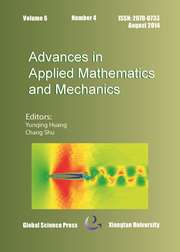Crossref Citations
This article has been cited by the following publications. This list is generated based on data provided by Crossref.
Hami, Khelifa
Draoui, Belkacem
Imine, Omar
and
Hami, Omar
2016.
Thermal fluid modeling of a passive heating system.
Journal of Renewable and Sustainable Energy,
Vol. 8,
Issue. 1,
Fotso, Yves Fotso
Touzeau, Suzanne
Tsanou, Berge
Grognard, Frédéric
and
Bowong, Samuel
2022.
Mathematical modelling of a pest in an age-structured crop model: The coffee berry borer case.
Applied Mathematical Modelling,
Vol. 110,
Issue. ,
p.
193.
Vala, Jiří
and
Jarošová, Petra
2023.
On computational stability of explicit schemes in nonlinear engineering dynamics.
Vol. 2849,
Issue. ,
p.
370004.
Nie, Xin
Li, Jun
Datta, Trinanjan
and
Yao, Dao-Xin
2024.
A spin–rotation mechanism of Einstein–de Haas effect based on a ferromagnetic disk.
Frontiers of Physics,
Vol. 19,
Issue. 5,


